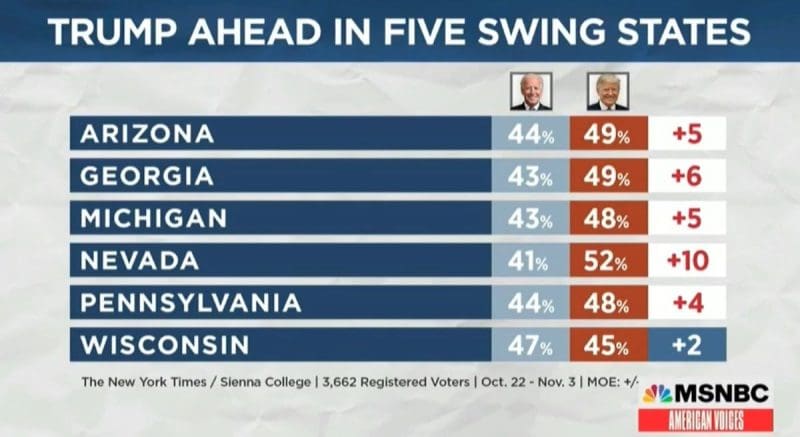
As the United States approaches a significant juncture one year out from the next presidential election, the political landscape is charged with an electric anticipation and an undercurrent of intense scrutiny.
The nation finds itself at a crossroads, with critical decisions looming on the horizon, decisions that will indubitably shape the trajectory of American democracy and its global impact.
In a climate where dissatisfaction mingles with aspiration, former President Donald Trump has emerged with a discernible lead over incumbent President Joe Biden, as revealed by a recent CBS News/YouGov survey. This lead is not a mere reflection of prevailing despondency but a complex interplay of economic concerns, foreign policy perspectives, and an analysis of racial dynamics, each acting as a catalyst in the political equation.

Economic Undercurrents Influencing Voter Sentiment
The economic narrative has been dominant in the minds of voters, with many expressing enduring financial hardships exacerbated by inflation and rising interest rates. There exists a palpable sense among a segment of the electorate that they would fare better under a Trump administration. This sentiment is not purely punitive toward President Biden but stems from a conviction that Trump’s policies would offer them financial relief.
The perception that the wealthy are favored in today’s America continues to be a sore point for Biden, who appears to lag in convincing voters that his second term would usher in a change in this dynamic. Trump’s economic messaging seems to resonate more convincingly with voters who feel left behind, suggesting a critical area for the Biden administration to address.
The International Arena as a Political Chessboard
Foreign policy, while not the central driver of votes, casts a long shadow over the electoral prospects of President Biden. Trump is viewed by many as the candidate who could steer the nation away from the precipice of war and foster global peace and stability. These perceptions present formidable challenges for President Biden as he seeks to project a vision of strong and effective international leadership.
Trump’s perceived isolationist tendencies appeal to voters weary of international entanglements, fortifying his position among those who prioritize an America-centric approach to global affairs.
Race: An Enduring Theme in American Politics
The role of race in American politics continues to be both pivotal and divisive. A significant number of White voters who support Trump harbor the belief that racial minorities are favored over White people in current American society but that Trump would strive for egalitarian treatment for all. On the other hand, Biden’s voters predominantly see a society that advantages White individuals, with a belief that Biden would endeavor to create parity.
This dichotomy extends to the economic domain, particularly impacting the support among Black and Hispanic voters. A dwindling confidence that a Biden presidency would bolster their financial well-being has led to a softening of support from these vital components of the Democratic base.
The Crucible of Abortion Rights
The abortion debate has maintained its potency as a political issue, particularly in the wake of the 2022 midterms. Democrats appear more galvanized by this issue, and it presents an opportunity for Biden to consolidate support within his party. The public’s overall support for mostly legal abortion access underscores the potential for this issue to become a defining one in the upcoming election.
Looking to the Horizon: Polling and Political Fortunes
In the grand tapestry of American politics, early polls serve as a barometer of public sentiment, and the CBS News/YouGov survey signals a shifting wind. Trump’s lead over Biden, while not insurmountable, suggests a burgeoning confidence among his supporters who feel hopeful and motivated at the prospect of his return. Biden’s backers, meanwhile, are beset with nerves and frustration, a state of affairs that may well define the strategic contours of his campaign moving forward.
Final Thoughts
The electoral journey to 2024 promises to be fraught with intense debate, strategic calculations, and a populace keenly awaiting a vision that resonates with their aspirations and alleviates their apprehensions. The path ahead for both candidates will require not just a message that resonates but one that is also rooted in a realistic appraisal of America’s societal and economic fabric. As history has often shown, a year in politics can be a lifetime, and the road to the next election will be as unpredictable as it is inevitable. One thing for sure it’s going to be the most negative campaign in the history of politics.
The survey conducted between October 30th and November 3rd, 2023, with its margin of error of ±2.6 points, offers a snapshot of the national mood, a prelude to the unfolding electoral drama where every act and speech will be meticulously analyzed by a populace increasingly demanding in its expectations for authentic and effective governance.
